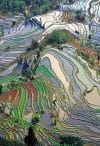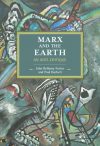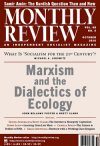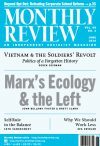
Ecology


Marx as a Food Theorist
Food has become a core contradiction of contemporary capitalism. Discussions of the economics and sociology of food and food regimes seem to be everywhere today, with some of the most important contributions made by Marxian theorists. Amid plentiful food production, hunger remains a chronic problem, and food security is now a pressing concern for many of the world’s people.… Despite the severity of these problems and their integral relation to the capitalist commodity system, it is generally believed that Karl Marx himself contributed little to our understanding of food…. [Yet] food for Marx was far more than a “passing interest”: in his work one finds analyses of the development of agriculture in different modes of production; climate and food cultivation; the chemistry of the soil; industrial agriculture; livestock conditions; new technologies in food production and preparation; toxic additives in food products; food security; and much more. Moreover, these issues are not peripheral, but organically connected to Marx’s larger critique of capitalism. | more…

Why Ecosocialism Needs Marx
In his recent foreword to the second edition of Paul Burkett’s Marx and Nature, John Bellamy Foster reflected on a significant change in left attitudes toward Marx’s ecology: “Today Marx’s understanding of the ecological problem is being studied in universities worldwide and is inspiring ecological actions around the globe.” This worldwide recognition of Marx’s ecological critique of capitalism without doubt owes much to Burkett’s Marx and Nature (1999) and Foster’s Marx’s Ecology (2000). Yet the new interest in ecological Marxism did not originate solely with these books. Rather, as their new co-authored book Marx and the Earth documents, over the last fifteen years Burkett and Foster have meticulously refuted the many criticisms of Marx from so-called “first-stage ecosocialists”…. It should be noted that, whatever their disagreements with Marx, the first-stage ecosocialists were also deeply critical of capitalism. So why are Foster and Burkett arguing with their potential comrades? Furthermore, some of the issues taken up in Marx and the Earth might appear abstruse at first glance—why bother debating them at such length?… [A] patient reader will soon recognize the book’s importance and the significance of the issues at stake. | more…

October 2016 (Volume 68, Number 5)
On August 29, in a historic moment in the history of the planet, the 35-member Anthropocene Working Group (AWG) reported to the International Geological Congress that the Anthropocene epoch in geological history is “stratigraphically real” and should be dated as arising around 1950, displacing the Holocene epoch of the last 12,000 years. The AWG has yet to arrive at a formal decision that would adopt a definite global “signal” (though ten of the thirty-five members currently support using fallout radionuclides from atomic weapons testing as the signal), which would be followed by the designation of a “golden spike” or actual location in the rock, sediment, or ice strata. Yet the general parameters of the onset of the new epoch are clear.… As Colin Waters, secretary of the AWG, explained: “Being able to pinpoint an interval of time is saying something about how we have had an incredible impact on the environment of our planet. The concept of the Anthropocene manages to pull all these ideas of environmental change together.” Most importantly, it tells us that the world economy has generated an anthropogenic rift in the Earth system threatening millions of species, including our own, requiring fundamental changes in the way in which society relates to the earth through production. | more…
Marxism and the Dialectics of Ecology
The recovery of the ecological-materialist foundations of Karl Marx’s thought, as embodied in his theory of metabolic rift, is redefining both Marxism and ecology in our time, reintegrating the critique of capital with critical natural science. This may seem astonishing to those who were reared on the view that Marx’s ideas were simply a synthesis of German idealism, French utopian socialism, and British political economy.… The rediscovery of Marx’s metabolism and ecological value-form theories, and of their role in the analysis of ecological crises, has generated sharply discordant trends. Despite their importance in the development of both Marxism and ecology, neither idea is without its critics. One manifestation of the divergence on the left in this respect has been an attempt to appropriate aspects of Marx’s social-metabolism analysis in order to promote a crude social “monist” view based on such notions as the social “production of nature” and capitalism’s “singular metabolism.” Such perspectives, though influenced by Marxism, rely on idealist, postmodernist, and hyper-social-constructivist conceptions, which go against any meaningful historical-materialist ecology and tend to downplay (or to dismiss as apocalyptic or catastrophist) all ecological crises—insofar as they are not reducible to the narrow law of value of the system. | more…

Learning from Late Marx
Recent years have seen the development of a fresh area of research into Marx’s critique of political economy, based on his previously unpublished economic manuscripts and notebooks, which have been made newly available in the updated edition of the complete works of Marx and Engels, the Marx-Engels-Gesamtausgabe (MEGA). Lucia Pradella published the first detailed analysis in English of Marx’s London Notebooks, and Brill’s Historical Materialism book series recently celebrated its hundredth volume with a translation of Marx’s original manuscript for volume 3 of Capital, based on the new MEGA edition. The same series also published Heather Brown’s Marx on Gender, which drew extensively on his late notebooks. And earlier this year, the second, expanded edition of Kevin Anderson’s Marx at the Margins: On Nationalism, Ethnicity and Non-Western Societies appeared. The first edition of Anderson’s book, published in 2010, inaugurated this new trend in Marxist studies, and it remains among the most important achievements in the field. | more…
The Anthropocene Crisis
The Anthropocene, viewed as a new geological epoch displacing the Holocene epoch of the last 10,000 to 12,000 years, represents what has been called an “anthropogenic rift” in the history of the planet.… Recent scientific evidence suggests that the period from around 1950 on exhibits a major spike, marking a Great Acceleration in human impacts on the environment, with the most dramatic stratigraphic trace of the anthropogenic rift to be found in fallout radionuclides from nuclear weapons testing.… Viewed in this way, the Anthropocene can be seen as corresponding roughly to the rise of the modern environmental movement, which had its beginnings in the protests led by scientists against above-ground nuclear testing after the Second World War, and was to emerge as a wider movement following the publication of Rachel Carson’s Silent Spring in 1962. Carson’s book was soon followed in the 1960s by the very first warnings, by Soviet and U.S. scientists, of accelerated and irreversible global warming. It is this dialectical interrelation between the acceleration into the Anthropocene and the acceleration of a radical environmentalist imperative in response that constitutes the central theme of Ian Angus’s marvelous new book. | more…
Against Trophy Hunting
A Marxian-Leopoldian Critique
Contemporary North Americans hunt wildlife for a variety of reasons, whether to attain game meat, spend time with family and friends, or take part in a form of outdoor recreation. My focus here will be on…trophy hunting…[—]killing wildlife to enhance one’s status by appropriating the body parts of dead animals for display as trophies, ostensible evidence of hunting skills.… In the United States, trophy hunting organizations, such as Safari Club International and Sportsmen for Fish and Wildlife, claim to promote and defend two allegedly deeply rooted Western traditions: The popular practice of “common people” hunting, and the role that hunters and hunting organizations have played in protecting wilderness and wildlife.… These claims perpetuate a mythologized version of the history of Euro-American hunting. Contrary to their image as “true conservationists,” many trophy hunting organizations have promoted policies and activities with adverse social consequences, contributing to the environmental degradation they claim to oppose. | more…
Hydrocarbons and the Illusion of Sustainability
After fifty years, Paul Baran and Paul Sweezy’s Monopoly Capital has stood the test of time. Not only did it provide a lucid description of midcentury American society, but Monopoly Capital established a framework for analyzing events to come.… By bringing Marxian theory into their historical moment, they fomented many debates and encouraged the development of various perspectives, a legacy that has expanded to include analyses of the labor process, imperialism, finance, globalization, and the environment.… They elucidated a fundamental contradiction of the time. Capitalism is a system of self-expanding value that must continually accumulate, yet is confined by a social and institutional order that precludes rapid accumulation. This framework is especially useful for analyzing the fundamental problems of the twenty-first century. Among those crucial problems is the demise of the hydrocarbon economy. | more…

Big Farms Make Big Flu: Dispatches on Infectious Disease, Agribusiness, and the Nature of Science
Thanks to breakthroughs in production and food science, agribusiness has been able to devise new ways to grow more food and get it more places more quickly. There is no shortage of news items on the hundreds of thousands of hybrid poultry—each animal genetically identical to the next—packed together in megabarns, grown out in a matter of months, then slaughtered, processed, and shipped to the other side of the globe. In Big Farms Make Big Flu, a collection of dispatches by turns harrowing and thought-provoking, Rob Wallace tracks the ways influenza and other pathogens emerge from an agriculture controlled by multinational corporations. | more…

June 2016 (Volume 68, Number 2)
On April 8, 2016, in what has already become a historic case on the climate, Magistrate Judge Thomas Coffin of the United States District Court of Oregon ruled against a motion to dismiss, in favor of the youthful plaintiffs in the Children’s Trust lawsuit (Kelley Cascade Rose Juliana, et al. v. United States of America, et al.) and against the defendants, consisting of the federal government and the fossil-fuel industry.… The defendants’ argument to dismiss was directed principally at what they contended were limits on the federal government’s public trust responsibility. It thus turned on whether the United States was obligated simply to follow capitalist precepts with respect to the natural-physical environment, or whether the government had a public trust to maintain the environment for the population and for future generations, going beyond the rules of the market. | more…
Marx’s Ecology and the Left
One of the lasting contributions of the Frankfurt School of social theorists, represented especially by Max Horkheimer and Theodor Adorno’s 1944 Dialectic of Enlightenment, was the development of a philosophical critique of the domination of nature.… Yet their critique of the Enlightenment exploitation of nature was eventually extended to a critique of Marx himself as an Enlightenment figure, especially in relation to his mature work in Capital.… So all-encompassing was the critique of the “dialectic of the Enlightenment” within the main line of the Frankfurt School, and within what came to be known as “Western Marxism”…, that it led to the estrangement of thinkers in this tradition not only from the later Marx, but also from natural science—and hence nature itself. Consequently, when the ecological movement emerged in the 1960s and ’70s, Western Marxism, with its abstract, philosophical notion of the domination of nature, was ill-equipped to analyze the changing and increasingly perilous forms of material interaction between humanity and nature. | more…